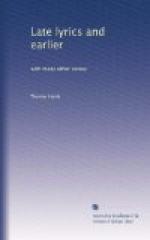And they felt past handlers clutch them,
Though none was in the room,
Old players’ dead fingers touch them,
Shrunk in the
tomb.
“’Cello, good
mate,
You speak my mind as yours:
Doomed to this voiceless, crippled, corpselike
state,
Who, dear to famed Amphion, trapped here, long endures?”
“Once I could thrill
The populace through and through,
Wake them to passioned pulsings past their will.”
. . .
(A contra-basso spake so, and the rest sighed anew.)
And they felt old muscles travel
Over their tense contours,
And with long skill unravel
Cunningest scores.
“The tender pat
Of her aery finger-tips
Upon me daily—I rejoiced thereat!”
(Thuswise a harpsicord, as from dampered lips.)
“My keys’ white
shine,
Now sallow, met a hand
Even whiter. . . . Tones of hers fell forth
with mine
In sowings of sound so sweet no lover could withstand!”
And its clavier was filmed with fingers
Like tapering flames—wan,
cold—
Or the nebulous light that lingers
In charnel mould.
“Gayer than most
Was I,” reverbed a drum;
“The regiments, marchings, throngs, hurrahs!
What a host
I stirred—even when crape mufflings gagged
me well-nigh dumb!”
Trilled an aged viol:
“Much tune have I set free
To spur the dance, since my first timid trial
Where I had birth—far hence, in sun-swept
Italy!”
And he feels apt touches on him
From those that pressed him then;
Who seem with their glance to con him,
Saying, “Not
again!”
“A holy calm,”
Mourned a shawm’s voice subdued,
“Steeped my Cecilian rhythms when hymn and
psalm
Poured from devout souls met in Sabbath sanctitude.”
“I faced the sock
Nightly,” twanged a sick lyre,
“Over ranked lights! O charm of life
in mock,
O scenes that fed love, hope, wit, rapture, mirth,
desire!”
Thus they, till each past player
Stroked thinner and more thin,
And the morning sky grew grayer
And day crawled
in.
THE WOMAN I MET
A stranger, I threaded sunken-hearted
A lamp-lit crowd;
And anon there passed me a soul departed,
Who mutely bowed.
In my far-off youthful years I had met her,
Full-pulsed; but now, no more life’s debtor,
Onward she slid
In a shroud that furs half-hid.
“Why do you trouble me, dead woman,
Trouble me;
You whom I knew when warm and human?
—How it be
That you quitted earth and are yet upon it
Is, to any who ponder on it,
Past being read!”
“Still, it is so,” she
said.
“These were my haunts in my olden sprightly
Hours of breath;
Here I went tempting frail youth nightly
To their death;
But you deemed me chaste—me, a tinselled
sinner!
How thought you one with pureness in her
Could pace this
street
Eyeing some man to greet?




